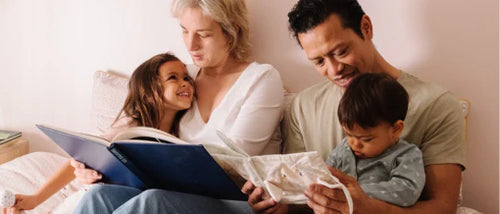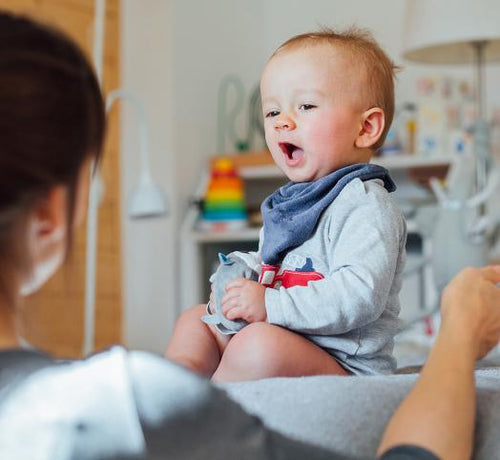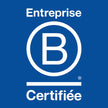At birth your baby does not yet know how to speak but he already communicates: through his looks, his postures, his facial expressions or his cries, he expresses his feelings and interacts with you.
At this stage, his potential is unlimited: naturally predisposed to acquire articulate language, he has the capacity to learn all languages and pronounce all sounds.
Even more astonishing, it can also distinguish different languages based on their melody. Little by little, his skills will diminish to concentrate on learning his mother tongue.
From the first look to the first sentence, your interactions with your baby are fundamental to leading him on the path to language: it is you who give meaning to the sounds he makes, and you who make him want to repeat them to the pleasure of seeing you react and respond to his requests.
From his first days, it is therefore essential to talk to your baby as much as possible and babble with him: by offering him a supportive environment, you will give him every chance of progressing quickly and harmoniously.
Language acquisition occurs at a very different pace depending on babies: some will already pronounce several words at one year old, while others will still express themselves in incomprehensible jargon at two years old.
So respect your child’s development! Stimulate and encourage him, but make him feel no pressure: the stronger your expectation, the more likely your little one will close down in an attitude of refusal.
BETWEEN 0 AND 1 MONTH: THE BIRTH OF COMMUNICATION
• When your baby is born, crying is his first mode of communication: he uses them to tell you that he is hungry, that he needs to be changed, that he needs your contact, that he is suffering.
FROM 2 TO 6 MONTHS: CASCADE CHIRPS
• Around two months, your baby begins to play with the capabilities of his larynx. Chuckles, coos, throat noises... He keeps chirping to the great amusement of those around him! This first babbling is common to all babies around the world.
• Around four months, vowels begin to appear, starting with “a” and “e”. A month later, baby manages to pronounce his first consonants: this is the age of the famous “areuh”. At this stage, your baby has already adopted his mother tongue: a Chinese baby or an Egyptian baby does not produce exactly the same chatter as your little French one! To stimulate him, talk to him and repeat his own chatter: your enthusiasm encourages him to persevere.
FROM 6 TO 9 MONTHS: REPEATED SYLLABLES • Around the age of 6 months, your baby takes great pleasure in repeating syllables ending in “a”: “dadadada”, “papapapa”, “mamamama”… These sounds n have no precise meaning in his mind: it is you who will gradually give them meaning by responding to them. What a joy for him to see you arrive saying “Mommy is here” when he says “mamamama”! He thus discovers the symbolic dimension of language: a sound corresponds to an object.
FROM 9 TO 12 MONTHS: HERE ARE THE FIRST WORDS! • Around ten months, your baby begins to pronounce strings of syllables without repetition. He will thus gradually compose a little jargon often so incomprehensible that he seems to be speaking a foreign language!
• Gradually, his language will become intelligible: the first words generally appear around 1 year of age. If it's not "dad" or "mom", don't take offense... Your baby first needs to designate what he wants and which is not within his reach: he doesn't name you, it's probably because you are very available to him. Often, he makes very broad use of his first words: for example, by saying “lolo”, your baby can mean both the bottle or the breast, hunger, thirst, the desire for cuddles, etc.
• His understanding progresses faster than his ability to express himself: at one year old, he already understands very well a multitude of simple sentences such as “Come”, “Give it to mom”, “Are you hungry? », “Go get your blanket”, etc.
BETWEEN 15 AND 18 MONTHS: THE THIRST TO LEARN
• Delighted with his new ability to speak, your baby is eager to learn new words: he points to objects in his environment to ask their names. Respond to his requests and remember to name the things you talk to him about to help him expand his vocabulary.
• At 18 months, he masters between 10 and 20 words which he begins to associate with each other: for example, “still milk” or “daddy gone”. If he pronounces incorrectly, do not systematically correct him: you risk upsetting his enthusiasm and spontaneity. Instead, make another sentence after it, in which you correctly pronounce the word that was causing the problem.
BETWEEN 18 AND 24 MONTHS: THE EXPLOSION OF VOCABULARY Between one and a half and two years, your child's vocabulary progresses exponentially: at 24 months, he can count up to 300 words. Your little one loves to talk, and you sometimes have a hard time stopping him! He is now able to form simple sentences, first with a verb in the infinitive (“Jules eat cake”). He also knows how to use the pronouns “me”, “I” and “you”.
AROUND 3 YEARS OLD: I SPEAK LIKE A GROW UP
• Most of the language is acquired, even if pronunciation may still be imperfect: your child composes complex sentences, conjugates verbs and uses the present, past and future correctly. He may surprise you with expressions that seem to come straight from an adult's mouth, which he repeats just as he heard them! It’s also the age of “why?” » incessant: his curiosity about his environment and his desire to learn new words are insatiable. Try to answer them as best you can to stimulate their intellectual development.
• Very often, starting school is also an opportunity for spectacular progress, thanks to the numerous stimulations received from teachers, supervisory staff but also from other children.
• If your child seems to be behind in terms of language, do not hesitate to consult a pediatrician. Many factors can hinder his progress: hearing or neurological disorders, defect in the organs of speech, psycho-affective blockage... Only a professional will be able to help you determine if your child is indeed late and, if so, the causes of this discrepancy.




